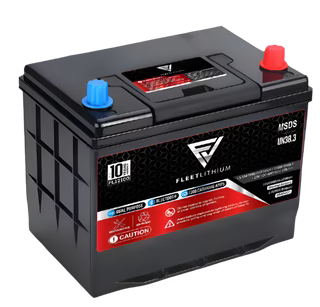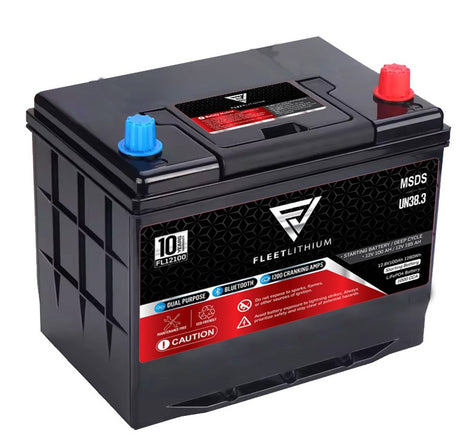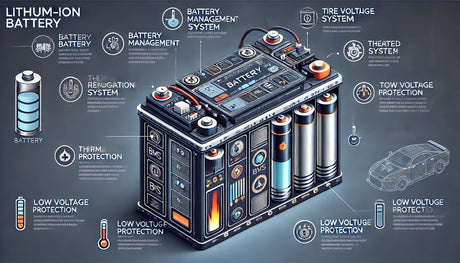The Safety Concern: Understanding the Risks of Lithium-Ion Batteries
While lithium-ion batteries are widely regarded for their high energy density and reliability, safety remains a primary concern. The risk of overheating, fires, or even explosions exists if these batteries are damaged, overcharged, or improperly handled. This is especially important in applications where safety is critical, such as electric vehicles (EVs), recreational vehicles (RVs), marine vessels, and other mobile applications. Users in these industries require batteries that are not only high-performing but also safe, as a failure to manage battery temperature or charge can have catastrophic results.
Overcharging, deep discharging, short-circuiting, or exposure to extreme temperatures can trigger dangerous thermal runaway reactions. These reactions cause the battery to heat up rapidly, potentially leading to fire, explosion, or even toxic gas emissions. In high-demand applications like electric vehicles or off-grid solar energy systems, where users depend on battery reliability in critical situations, these risks are not something to be taken lightly.
Fleet Lithium’s Safety Measures: Advanced Technologies to Prevent Overheating and Fires
At Fleet Lithium, we believe that safety should never be compromised, and we’re committed to providing lithium iron phosphate (LiFePO4) batteries that are not only efficient and long-lasting but also safe and secure for users in all industries.
To minimize the risks associated with overheating, overcharging, or potential fire hazards, Fleet Lithium employs the following advanced safety measures:
-
Battery Management System (BMS)
The backbone of our safety protocols lies in our Battery Management System (BMS), an advanced technology integrated into every Fleet Lithium battery. The BMS continually monitors key parameters such as voltage, current, and temperature to ensure that the battery operates within safe limits. The system actively regulates the charge and discharge cycles, preventing overcharging, deep discharging, and ensuring that the battery never exceeds its recommended operating temperature range.The BMS also protects against short circuits and overcurrent situations, automatically disconnecting power if unsafe conditions are detected, reducing the likelihood of catastrophic failures.
-
Thermal Protection: Safeguarding Against Overheating
Fleet Lithium batteries are equipped with thermal protection mechanisms that monitor and respond to temperature fluctuations. Our batteries include internal temperature sensors that trigger protective actions, such as limiting charge and discharge rates or disconnecting the battery from the circuit if temperatures rise above safe thresholds. This significantly reduces the risk of overheating, even in demanding applications.Thermal runaway is one of the most dangerous risks in lithium-ion battery technology, but with Fleet Lithium’s sophisticated thermal management systems, users are ensured a higher level of safety, even during extreme usage scenarios.
-
Robust Construction and Design
Fleet Lithium batteries are designed with durable, fire-resistant enclosures and advanced thermal insulation to minimize the risk of a fire spreading in the unlikely event of a malfunction. The materials used in the construction of our batteries are selected to withstand high temperatures and provide additional safety layers to prevent potential hazards. -
Overcharge and Overdischarge Protection
Overcharging and overdischarging are both major causes of battery failure. To combat this, Fleet Lithium’s batteries include automatic cut-off features to prevent excessive charging or discharging. These safeguards ensure that batteries are never subjected to conditions that could lead to internal damage or thermal issues. This is particularly crucial in high-demand applications like electric vehicles and solar energy systems, where continuous, reliable battery performance is needed for safety. -
Compliance with Global Safety Standards
At Fleet Lithium, safety is built into every aspect of our products. Our batteries are rigorously tested to meet global safety standards, including certifications such as UL (Underwriters Laboratories), CE (Conformité Européenne), and IEC (International Electrotechnical Commission) standards. These certifications ensure that our batteries meet the highest global safety benchmarks for thermal stability, charging and discharging rates, and overall reliability.Whether it’s for marine, RV, or solar energy applications, our batteries are designed to handle the specific demands of each sector while ensuring peace of mind for our customers.
-
Comprehensive Testing and Validation
Before any Fleet Lithium battery reaches the market, it undergoes a series of rigorous tests to simulate real-world conditions, ensuring optimal performance and safety. From high-temperature stress tests to shock resistance tests, we thoroughly validate every product for its resilience against external factors that could otherwise compromise its safety. This extensive testing process ensures that Fleet Lithium batteries can handle a wide range of environmental conditions and user scenarios.
Fleet Lithium: A Commitment to Safety and Performance
At Fleet Lithium, we understand that battery safety is not just a feature—it’s a priority. By integrating the latest safety technologies, including advanced BMS, thermal protection, and compliance with safety standards, we give our customers the confidence to use our batteries in some of the most demanding applications with peace of mind.
Whether you’re using Fleet Lithium batteries for marine, RV, or solar applications, or even in electric vehicles, you can trust that our products have been engineered to provide maximum safety alongside uncompromising performance. We are committed to ensuring that our batteries provide not only power and efficiency but also the highest levels of safety to protect you, your equipment, and the environment.
Fleet Lithium – Performance Batteries Built for Safety and Reliability.


















